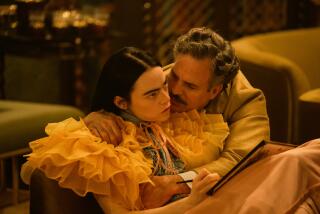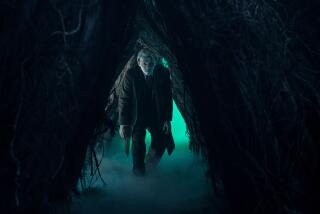Off With His Mechanical Head! : A CASE OF CURIOSITIES, <i> By Allen Kurzweil (Harcourt Brace Jovanovich: $19.95; 382 pp.)</i>
- Share via
“A Case of Curiosities” is a historical novel ofa modern sort, related to the kind of history that many historians are writing nowadays. It is not the history of great men, battles, political and diplomatic issues, or large economic and social movements. It is history taken from parish records, tax rolls and accounts of markets, town and country festivals, trials and commercial transactions. It studies inventions, pamphlet printing, rodent plagues, sewers, sexual mores, what goes on in carnivals and how laundry is done.
Allen Kurzweil’s novel is about Claude Page, an obscure French inventor in the pre-industrial 18th Century. His passion is small movements: those of watches and mechanical toys. His life’s climactic event is the invention of an automaton. It does not do much: Dressed in Turkish robes and turban, it nods its head, waggles its jaw and grates out: “ Vive le roi .”
A small thing, seemingly, and yet it was a time when all things--science, medicine, arts and crafts and the structures of society--were being stood on their heads. What was beginning to emerge was a drastic expansion of human possibilities and a drastic refiguring of the human’s role in the universe. Claude Page’s Talking Turk stands for much more than itself, and it takes its place, appropriately, in the great tumult of the times.
After touring Europe with his invention, Page returns to France and is made prisoner by the authorities of the Revolution. Or, rather, his invention is. For uttering its salute to the king, the device is tried, condemned and guillotined. Revolutions don’t propagate evenly; the Paris insurgents may have beheaded a dynasty, but they were still medievally foggy on the difference between a man and his invention.
So far, as scheme and theme, so good. But a novel needs more to succeed, particularly a large-framed, ambitious chronicle of the kind that Kurzweil has attempted. His story of Claude--a village boy whose talents catch the eye of the local nobleman and who, after a misunderstanding, flees his patron, goes to Paris, undergoes a series of picaresque ups and downs, and finally finds his calling--is full of color and movement, but it only lives sporadically.
Part of the difficulty may be that not all kinds of history lend themselves equally to historical fiction. A historiography that rests on the role of individuals moving through their circumstances fictionalizes nicely, since the novel, at least the traditional novel, works through character in action. It is harder to find a place for fiction in a history based on customs, transactions, rituals and celebrations. A monograph describing and exploring a village kermesse can be fascinating and revealing; in fiction, it is at best a brilliant background. But a background needs foreground actors.
The difficulty is only relative, perhaps. But Kurzweil’s talent is for historical evocation, for sensing patterns and suggesting their evolution. His detail--Claude’s life in his village, the household and workshops of his patron Auget, the life of a Paris apprentice, the rhythm of the highways with their coachmen and coaching inns--tends to have a bookish quality. Describing Claude’s day off, the author refers to the 67 entries for “Sunday” in “The Dictionary of French Folk Culture.”
Claude’s adventures have their lively moments, although they are awkwardly strung together, like film clips that don’t quite make a film. Auget, who is both count and abbe--he was a former Jesuit priest removed for homosexuality and excessive scientific experimentation--begins the boy’s training by putting him to work on the pornographic watches he sells to aristocratic patrons in Paris. Fully dressed couples on the watch case are shown naked when the case is opened; the watch movements set them to jiggling lubriciously.
When Claude, wrongly suspecting the abbe of a hideous crime, flees to Paris, his life as a brutally exploited apprentice bookseller is vividly set out. So are the lives of his friends: a coachman, a hack journalist, a wet nurse and others.
The author produces a series of vignettes, some of them quite striking, but they are striking as historical oddities, not as the actions and affairs of living characters. The abbe is a complex mixture of decadence and innocent vitality; he is an appealing figure, but Kurzweil has not quite brought him to life. He comes closer here than with the others, though. Claude’s inventing passion remains abstract; his experiments are more interesting than he is.
In his attempt to suggest a broadly moving panorama of 18th-Century life, Kurzweil uses materials that are sometimes second-rate. There is what seems to be an attempt at a Tristram Shandy style of exuberance, variety and avalanching wit, but it all runs pretty thin. We read of Claude’s cottage being “as cozy as a watch in a fat man’s pocket.” Of a group of laborers, the author writes that “armpits thick with 18th-Century sweat were cleansed with refreshing 18th-Century water.” Dining richly at the abbe’s, Claude wonders: “Is he tasting Boar’s tongue or is Boar’s tongue tasting him?” It is all a bit like one of those Merrie Englande Medieval Banquet deals where the service is portion-controlled.
“A Case of Curiosities” is written with a laborious framing device. A contemporary narrator buys at auction a cabinet containing artifacts from Claude’s life. These lead him to spend six years researching the life. He sends the results to a friend, who writes back: “It would seem that the story of an invention has resulted in the invention of a story.” That is the trouble; it hasn’t, quite. Kurzweil has not really managed to turn his historical notions into a real story.
More to Read
Sign up for our Book Club newsletter
Get the latest news, events and more from the Los Angeles Times Book Club, and help us get L.A. reading and talking.
You may occasionally receive promotional content from the Los Angeles Times.










